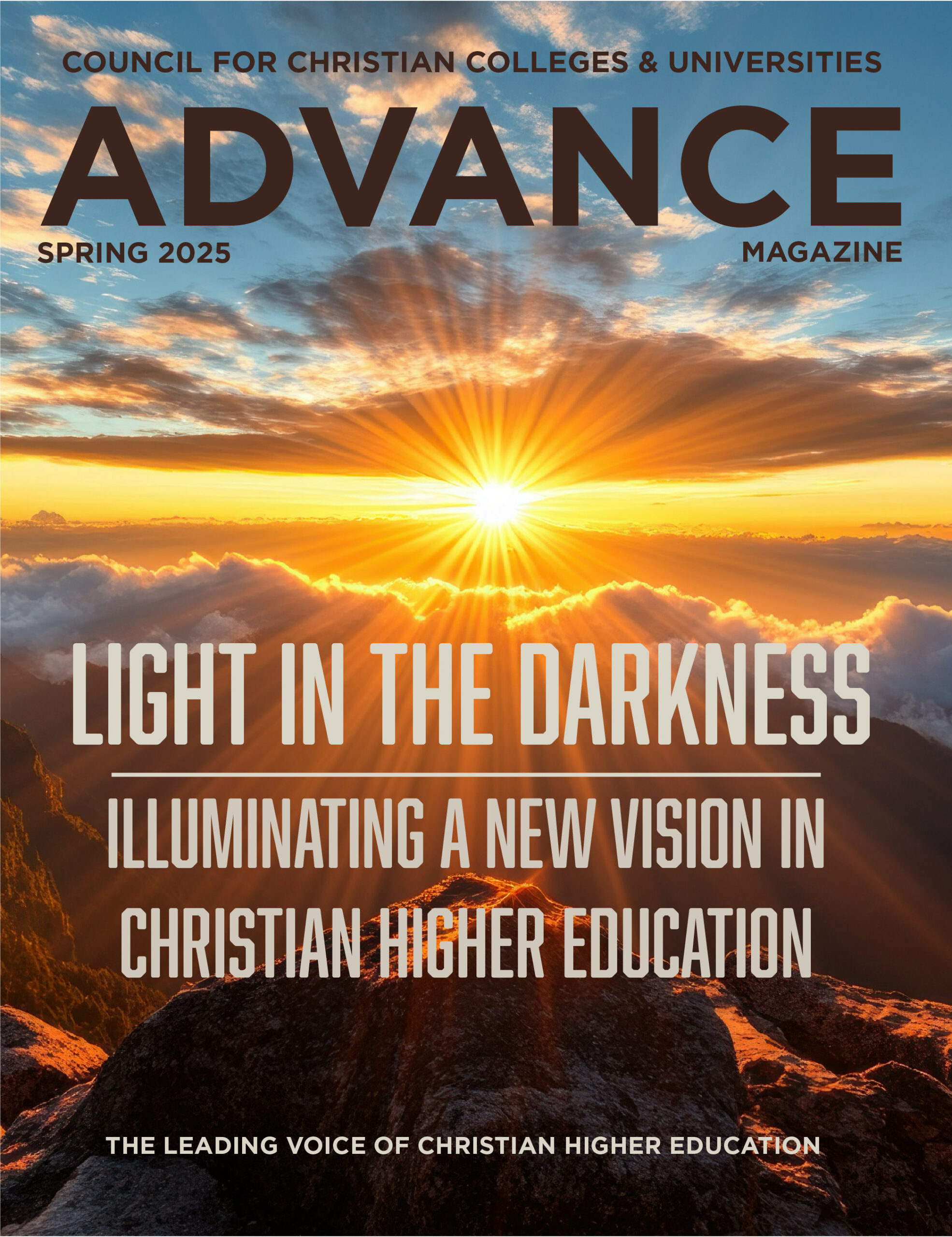Magazine
College administrators consistently gather, analyze, and share data from across campuses. Accreditation requirements, updates for trustees, assessment of the success or needed improvements of current programs, data that informs and encourages potential students (and their parents) to enroll — any multitude of reasons compel campus leaders to know as much as they can about how certain efforts are doing on campus.
Core to the identity and mission of Christian colleges and universities is something notoriously hard to measure — the practice of faith-learning integration in the classroom. Some of the latest work in this area was published in the journal Christian Higher Education (2023: Vol. 22, No. 1), by Preston Cosgrove, associate professor in the School of Education at Concordia University-Wisconsin. His work, “Measuring Faculty Faith & Learning Involvement: Toward the Validation of a Survey Instrument,” aimed to develop and validate a tool to measure faculty’s self-assessed involvement in faith-learning integration.
Though his survey tool was successful in its goal, Cosgrove contends his tool is meant to be an initial step toward administrators trying to determine the best methods for training and professional development. He notes that “measuring involvement does not address pedagogical techniques, the faculty member’s own conceptual/theoretical framework, or other areas” that other assessments have attempted to capture (several of which he discusses in the piece).
While the myriad of approaches to assessing faith-learning integration are part of what makes such efforts so difficult, value exists in successful assessment. As Cosgrove offers, this research “allows an institution to be better informed about the current state of faculty perceptions, to clarify areas of faculty growth, and to inform future professional development approaches, which are important means to help fulfill the very mission of Christian colleges and universities.”
With that in mind, we have developed five points for your campus administrators to consider if you want to assess the success of the faith-learning integration happening on your own campus.
- Make sure you know what you’re trying to measure.
Does your institution have a specific vision or definition of what faith-learning integration looks like on your campus? For example, Azusa Pacific University (Azusa, CA) has an Office of Faith Integration tasked with the mission “to facilitate the dialogue between academics, the knowledge of their discipline and/or profession, and the Christian faith by resourcing our faculty in their efforts to bring faith to life in their research, their teaching, and their scholarship.” Another key resource for the APU community is the Faith Integration Faculty Guidebook, designed as a comprehensive resource for faculty wanting to understand what faith integration looks like on campus, including how it factors into faculty evaluations.
Similarly, a shared understanding of what faith-learning integration should look like on your campus and/or in each department is necessary before attempting to gauge whether that goal is being met. Additionally, make sure everyone who will participate in an assessment — from long-time administrators to new adjunct faculty — is reminded of and understands your institution’s goals for integrating faith and learning prior to starting the process. Doing so can better ensure everyone is on the same page of what you’re trying to measure.
- Consider differences among departments and/or fields of research.
Some departments — like theology — should have no problem answering an assessment measuring how they bring faith into the classroom. Departments such as computer science or mathematics, however, might have a harder time, especially if there has previously not been a clear approach outlined by the university and/or department. Discussions with department heads prior to the creation of a campus-wide survey can aid in identifying the questions and approaches that will gather the best information from each department.
- Make intentions about assessment efforts clear.
Your campus likely has a number of tools already used to assess a faculty member’s job performance. A survey to measure faith-learning integration may be viewed as another item in the performance review process — and faculty will adjust their responses accordingly. In developing your assessment, decide whether such an effort will purely be used for broader analysis and planning or in individual performance evaluation. Be sure to clearly communicate those intentions prior to conducting the survey.
- Treat it as a unique assessment effort.
With a broad spectrum of assessment efforts already in place, lumping all surveys into one, including this one, can prove tempting. But just as the integration of faith and learning is unique to the work of CCCU campuses as compared to higher education broadly, so, too, will the assessment of this integral part of CCCU campus life be unique from other measurements. As the saying goes, “Not everything that can be counted counts, and not everything that counts can be counted.”
- Follow through on your research.
As Allin Means, an associate dean and professor at Missouri Baptist University, shares in “The Outward Impact of Faith and Learning Integration,” “The best way to do faith and learning is to keep doing it and keep it at the front of our minds.” Thus, ensure that as much — if not more — time as is spent on providing training for your faculty and enabling them to pursue the practice of integrating faith with learning in their classrooms is spent on developing and deploying assessments of faith and learning integration. An assessment tool is not the end to the process; rather, it’s a way to help everyone continually assess, improve, and innovate in the work they are so passionately committed to: raising up the next generation of thinkers who serve Jesus Christ with both mind and heart.
Special thanks to Preston Cosgrove at Concordia University-Wisconsin and Todd Ream at Indiana Wesleyan University for their assistance in developing this piece.
Recommended Resources
- “Measuring Faculty Faith & Learning Involvement: Toward the Validation of a Survey Instrument,” Preston B. Cosgrove (Christian Higher Education, Vol. 22, No. 1)
- Where Wisdom May Be Found: The Eternal Purpose of Christian Higher Education, Edward P. Meadors, ed. (Pickwick Publications, 2019)
- On Christian Teaching: Practicing Faith in the Classroom, David I. Smith (Eerdmans, 2018)
- “Where Faith and Learning Intersect: Re-Mapping the Contemporary Terrain,” Stephen Moroney (Christian Scholar’s Review, Winter 2014)
Morgan Feddes Satre is the managing editor of Advance. She holds degrees from two CCCU institutions — a master’s from Fuller Theological Seminary (Pasadena, California) and a bachelor’s from Whitworth University (Spokane, Washington).




